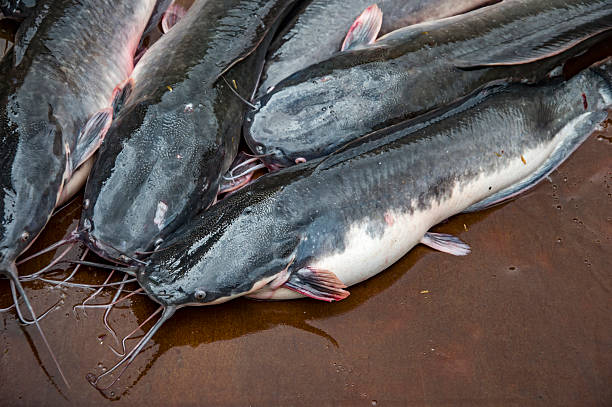This content is for informational and educational purposes only. Always consult a qualified healthcare provider.
Last Updated on February 5, 2024 by Grace Oluchi
Catfish is a good source of protein, which is important for repairing muscles, tissues, and cells in the body. It also contains essential vitamins and minerals, such as vitamin B12, vitamin D, iron, and potassium. Vitamin B12 is (maintaining healthy nerve and red blood cells). Vitamin D (helps the body absorb calcium and maintain strong bones). Iron is also essential for producing red blood cells, potassium helps regulate blood pressure and fluid balance in the body.
It is also low in calories and fat and a good choice for people trying to maintain healthy weight. A 3-ounce serving contains 122 calories and 3g of fat, which is much lower than other types of meat.
However, it is a good source of protein and other important nutrients.
📋 Table of Contents
Here are 15 nutrients in Catfish:


- Protein: it is a great source of high-quality protein, which is essential for building and repairing tissues.
- Omega-3 fatty acids: it also contains omega-3 fatty acids, which are important for heart health and brain function.
- Vitamin B12: important for nerve function and the production of red blood cells.
- Vitamin D: it contains vitamin D, which is important for bone health also immune system function.
- Calcium: it contains calcium, which is important for bone health and muscle function.
- Iron: it is a good source of iron, which is important for blood health and energy production.
- Phosphorus: it contains phosphorus, which is important for bone health and energy production.
- Magnesium: it contains magnesium, which is important for muscle and nerve function, as well as bone health.
- Potassium: it contains potassium, which is important for heart health and muscle function.
- Zinc: it is a good source of zinc, which is important for immune system function and wound healing.
- Selenium: it contains selenium, which is important for immune system function and thyroid health.
- Niacin: it is rich in niacin, which is important for energy production and healthy skin.
- Riboflavin: it contains riboflavin, which is important for energy production and healthy skin.
- Thiamin: it is a good source of thiamin, which is also important for energy production and nerve function.
- Vitamin B6: it contains vitamin B6, which is important for brain function and the production of red blood cells.
Benefits.
Here are 15 potential benefits:
- Good source of protein: it is a great source of high-quality protein, which is essential for building and repairing tissues.
- May help with weight loss: it is low in calories and high in protein, which can help with weight loss.
- Good for heart health: it contains omega-3 fatty acids which is important for heart health.
- May help lower blood pressure: The potassium in catfish may help lower blood pressure and reduce the risk of heart disease.
- Rich in vitamin B12: it is rich in vitamin B12, which is important for nerve function and the production of red blood cells.
- Good for bone health: it contains calcium, phosphorus, and magnesium, which are important for bone health.
- Boosts energy: it contains iron, which is important for blood health and energy production.
- May improve brain function: The omega-3 fatty acids in catfish may help improve brain function and reduce the risk of cognitive decline.
- Good for skin health: Catfish is rich in niacin, riboflavin, and vitamin B6, which are important for healthy skin.
- May reduce inflammation: The omega-3 fatty acids in catfish may help reduce inflammation in the body.
- Good for muscle function: it contains potassium, magnesium, and calcium, which are important for muscle function.
- May improve mood: The omega-3 fatty acids in catfish may help improve mood and reduce the risk of depression.
- Boosts immune system: catfish contains zinc, selenium, and vitamin D, which are important for immune system function.
- May reduce the risk of cancer: The selenium in catfish may help reduce the risk of certain types of cancer.
- May improve thyroid function: The selenium in catfish may help improve thyroid function and reduce the risk of thyroid disease.
Potential Risks of Eating Catfish.
While catfish can be a healthy and nutritious food choice, there are several potential risks associated with eating it.


Here are 15 risks of eating catfish that you should be aware of:
- Mercury Poisoning: Catfish can contain high levels of mercury, which is a toxic metal that can accumulate in the body and cause neurological and developmental problems in infants and young children.
- PCBs: they can also contain polychlorinated biphenyls (PCBs), which are toxic industrial chemicals that can cause cancer, reproductive problems, and other health issues.
- Dioxins: Catfish can also contain dioxins, which are highly toxic chemical compounds that can cause cancer and other health problems.
- Antibiotics: Some catfish farms use antibiotics to prevent and treat bacterial infections in the fish, which can lead to the development of antibiotic-resistant bacteria in humans.
- Pesticides: Catfish can contain pesticides and herbicides from runoff in water sources where they are farmed or caught.
- Parasites: Catfish can carry parasites, such as tapeworms and flukes, which can cause digestive problems and other health issues in humans.
- Allergic Reactions: Some people may have an allergic reaction to catfish, which can cause symptoms such as hives, itching, and difficulty breathing.
- Food Poisoning: Catfish can become contaminated with harmful bacteria, such as Salmonella and E. coli, which can cause food poisoning and other health problems.
- High Cholesterol: Catfish can be high in cholesterol, which can increase the risk of heart disease and stroke.
- Sodium: Some catfish dishes can be high in sodium, which can increase the risk of high blood pressure and other health problems.
- Environmental Contamination: Catfish can be exposed to environmental contaminants, such as heavy metals and industrial chemicals, which can accumulate in their flesh and be harmful to humans.
- Farmed Catfish: Farmed catfish can be raised in crowded and unsanitary conditions, which can lead to the spread of disease and contamination of the fish.
- Overfishing: Some species of catfish are overfished, which can lead to population declines and damage to aquatic ecosystems.
- Farming Practices: Some catfish farms use unsustainable and environmentally damaging farming practices, such as clear-cutting forests and destroying wetlands to create new farming ponds.
- Ethical Concerns: Some people may have ethical concerns about eating catfish, such as the treatment of the fish in farms and the impact of fishing on the environment.
The Key Takeaway.
Catfish can be a healthy and nutritious food choice when consumed in moderation and from clean sources. It is a good source of protein, vitamins, and minerals, and is low in calories and fat. However, it is important to be aware of the potential risks of eating catfish, such as exposure to mercury and other contaminants. To minimize these risks, it is wise that you choose catfish that is from clean waters, and limit your consumption of fish that are high in mercury and other pollutants.
What is catfish?
Catfish is a type of fish that is found in freshwater and is commonly used in cooking. It is mild, has a sweet taste and firm texture.
What are the health benefits of catfish?
Catfish is a good source of protein and omega-3 fatty acids, which are important for heart health and brain function. It is also low in calories and fat and high in vitamins and minerals such as vitamin B12 and selenium.
How is catfish typically prepared?
You can cook catfish in a variety of ways, including frying, grilling, baking, and sautéing. You can cook it with spices and herbs and can be with a variety of sides such as rice, vegetables, or potatoes.
Is catfish safe to eat?
Yes, catfish is safe to eat when cooked well. It is important to ensure to cook catfish to an internal temperature of 145 degrees Fahrenheit to kill any harmful bacteria.
Where can I find catfish?
You can see them in rivers, lakes, and ponds. It is commonly farmed in the southern United States, particularly in states such as Mississippi and Alabama.

